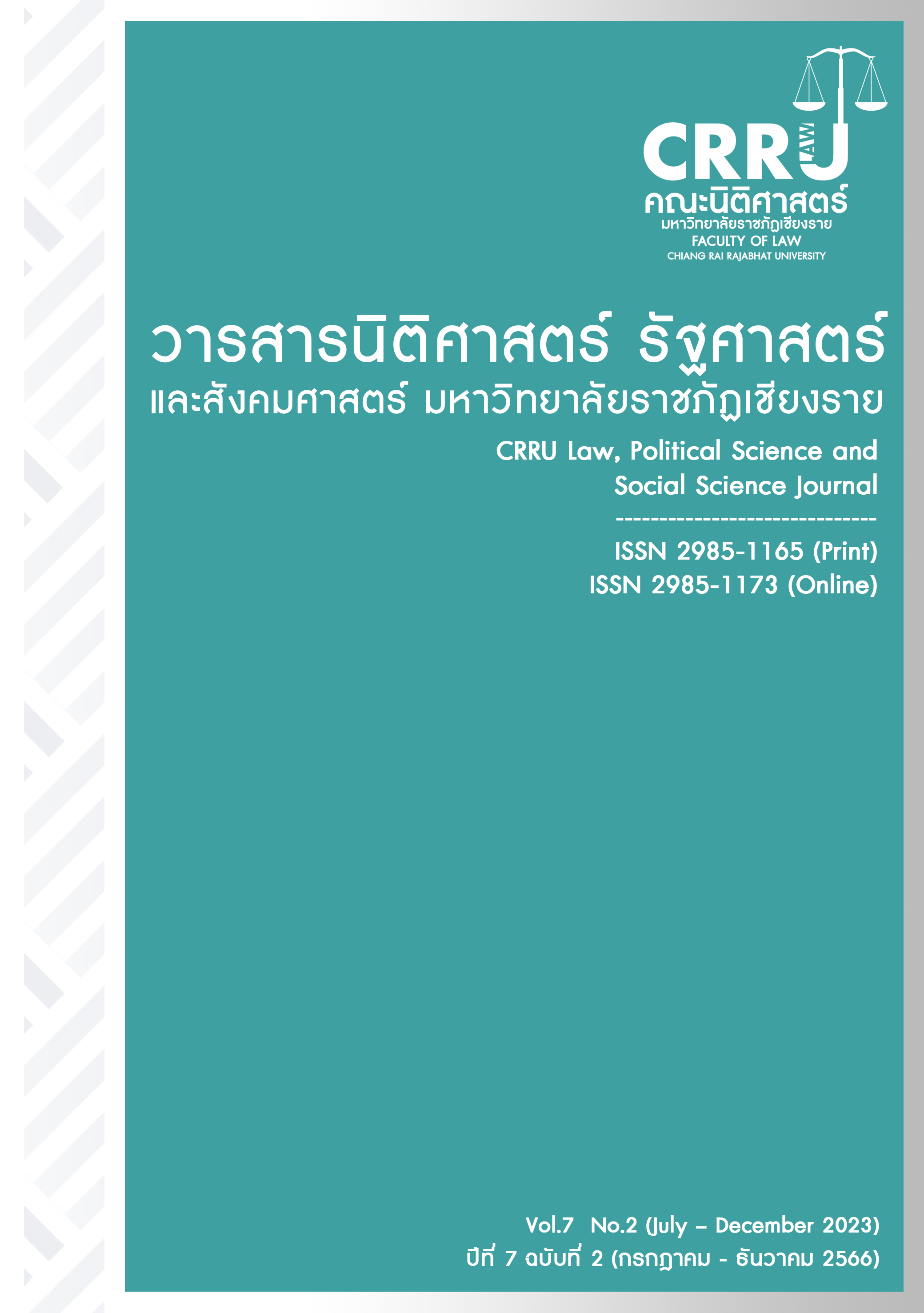โรจาวา: สัญญะความเป็นรัฐเชิงนามธรรมว่าด้วยการปกครองตนเอง ของชาวเคิร์ดกับการพัฒนาประชาธิปไตยในภูมิภาคตะวันออกกลาง
Main Article Content
บทคัดย่อ
บทความวิชาการนี้ มุ่งศึกษาการพัฒนาประชาธิปไตยของกลุ่มคนไร้รัฐชาวเคิร์ดในภูมิภาคตะวันออกกลางที่เรียกดินแดนในครอบครองของตนว่า “โรจาวา” ซึ่งมีลักษณะเป็นการปกครองแบบ “อนาธิปไตย” ที่ให้ความสำคัญกับสัญญะความเป็นรัฐเชิงนามธรรม โดยมีความพยายามในการปลดแอกกลุ่มชาติพันธุ์เคิร์ดออกจากการถูกปกครองของเชื้อชาติอื่นๆ ด้วยการรวมตัวกันจัดทำ “สัญญาประชาคม” และร่วมลงประชามติขอแบ่งแยกดินแดนออกจากประเทศซีเรีย เพื่อจัดตั้งเป็น “เขตปกครองตนเอง” ที่มีความเป็นอิสระทางการปกครองผนวกกับการใช้ฐานคติเกี่ยวกับการพัฒนาประชาธิปไตยเข้ามาเป็นหมุดหมายสำคัญ โดยเรียกรูปแบบการปกครองนี้ว่า “สหพันธ์ประชาธิปไตย” มีโครงสร้างประกอบไปด้วย หน่วยการปกครองระดับล่างขนาดเล็กที่สุดในสังคม เรียกว่า “คอมมูน” และหน่วยการปกครองระดับบนที่เกิดจากการรวมตัวกันของคอมมูนหลายแห่ง เพื่อจัดทำโครงการหรือกิจการสาธารณะร่วมกันอีกหนึ่งชั้น เรียกว่า “แคนตั้น” ทั้งนี้ “โรจาวา” ยังคงขาดหนึ่งองค์ประกอบสำคัญของการเป็นรัฐชาติ นั่นคือ “อำนาจอธิปไตย” แต่ก็ไม่ได้ถือเป็นอุปสรรคที่ส่งผลต่อการปกครองตนเอง เนื่องด้วยรัฐธรรมนูญซีเรียมีเนื้อหาสาระที่เอื้อประโยชน์ต่อการปกครองตนเองอยู่แล้ว นอกจากนี้ บริบทแวดล้อมที่มีความเกี่ยวข้องสัมพันธ์โดยตรงกับสภาวะสงครามกลางเมืองที่ยังคงคุกรุ่น ทำให้ชาวเคิร์ดมีความจำเป็นต้องพึ่งพาอาศัยซึ่งกันและกันอยู่เสมออย่างหลีกเลี่ยงไม่ได้ ด้วยเหตุนี้ ผู้นำชาวเคิร์ดจึงได้สร้างวาทกรรมเรียกขานเชิงพื้นที่ขึ้นมา เพื่อหล่อหลอมความรู้สึกร่วมทางชาติพันธุ์จนก่อให้เกิดสัญญะของการรวมตัวกันที่ช่วยเสริมสร้างความเป็นปึกแผ่นมั่นคงระหว่างกันเพิ่มมากยิ่งขึ้นอันนำไปสู่บูรณภาพทางการเมืองที่ส่งผลโดยตรงต่อความสามารถในการปกครองตนเองและการมุ่งเน้นอำนาจอธิปไตยระดับล่างเป็นสำคัญ ทำให้ดินแดนในฝันของชาวเคิร์ดนาม “โรจาวา” มีนัยหมายถึง การปกครองตนเองด้วยอำนาจอธิปไตยระดับรากหญ้าภายในท้องถิ่นขนาดเล็กอย่างเป็นเอกภาพ
Article Details
เอกสารอ้างอิง
ธิติ ไวกวี. “หลักอธิปไตยเหนือดินแดนที่ไม่สอดคล้องในยุคแอนโทรโปซีน.” วารสาร CMU Journal of Law and Social Sciences 12, ฉ.1 (มกราคม-มิถุนายน 2562): 1-21.
ยุทธศาสตร์ หน่อแก้ว. “รูปแบบการปกครองของกลุ่มแบ่งแยกดินแดนในตะวันออกกลาง: กรณีศึกษาเขตปกครองตนเองโรจาวา.” วารสารราชภัฏสุราษฎร์ธานี 9, ฉ.2 (กรกฎาคม-ธันวาคม 2565): 38-66.
ยุทธศาสตร์ หน่อแก้ว และพัชรี จิตเอื้ออังกูร. “บทวิเคราะห์เปรียบเทียบการจัดตั้งองค์กรปกครองส่วนท้องถิ่นรูปแบบคณะกรรมการตามหลักการกระจายอำนาจและการปกครองรูปแบบคณะกรรมการของสหพันธรัฐประชาธิปไตย กรณีศึกษาเขตปกครองตนเองโรจาวา (ซีเรียเหนือ).” วารสารมนุษยศาสตร์และสังคมศาสตร์ มหาวิทยาลัยราชภัฏอุบลราชธานี 12, ฉ.2 (กรกฎาคม-ธันวาคม 2564): 1-11.
Ali, B. Eroding the State in Rojava. Johns Hopkins University Press, 2016.
ANHA. “Final statement of Autonomous Administration of North, East Syria.” Hawar News Agency. Entry posted September 7, 2018. https://hawarnews.com/en/haber/final-statement-of-autonomous-administration-of-north-east-syria-h3608.html. accessed December 30, 2022.
Bradley, Matt., Albayrak, Ayla. & Ballout, Dana. “Kurds Declare 'Federal Region' in Syria, Says Official.” Wall Street Journal. Entry posted March 24, 2016. https://www.wsj.com/articles/kurds-declare-federal-region-in-syria-says-official-145821 6404. accessed December 30, 2022.
Clark, Ian. Legitimacy in international society. UK: Oxford University Press, 2005.
Darwish, Sardar Mullah. “What federalism would mean for northern Syria.” Al-Monitor. Entry posted March 27, 2017. https://www.al-monitor.com/originals/2017/03/syria-kurdish-democratic-council-arab-leader-federal.html?amp. accessed January 11, 2022.
Davies, Anna “Health after the Revolution: Rojava’s new approaches to health.” Kurdish Institute Brussels. https://www.kurdishinstitute.be/en/health-after-the-revolution-rojavas-new-approaches-to-health/. accessed January 21, 2023.
De Jong, Alex. “A Commune in Rojava?.” New Politics; New York 15 (Winter 4, 2016): 69-76.
Elassar, Alaa “Who are the Kurds and why are they under attack?.” Cable News Network (CNN). Entry posted October 10, 2019. https://edition.cnn.com/2019/10/09/world/kurds-in-syria-explainer-trnd/index.html. accessed December 27, 2022.
Espinosa, Elise Boyle & Ronan, Adam. “Rojava’s ‘war of education’: the role of education in building a revolutionary political community in North and East Syria.” Third World Quarterly (October, 2022): 1-19.
Fromkin, David. A Peace to End All Peace: The Fall of the Ottoman Empire and the Creation of the Modern Middle East. New York: H. Holt, 1989.
Graeber, David. Lost People: Magic and the Legacy of Slavery in Madagascar. Bloomington: Indiana University Press, 2007.
Harriet, Allsopp & Wladimir, Van Wilgenburg. The Kurds of Northern Syria: Governance, Diversity and Conflicts. UK: Bloomsbury Publishing, 2019.
Harvard University. Current History, Volume 13. New York: Times Co., 1921.
Helmreich, Paul C. From Paris to Sèvres: The Partition of the Ottoman Empire at the Peace Conference of 1919–1920. OH: The Ohio State University Press, 1974.
Hosseini, Anahita. “The Spirit of the Spiritless Situation: The Significance of Rojava as an Alternative Model of Political Development in the Context of the Middle East.” Journal of Socialist Theory 44 (July 3, 2016): 253-265.
Jongerden, Joost. “Autonomy as a third mode of ordering: Agriculture and the Kurdish movement in Rojava and North and East Syria.” Journal of Agrarian Change 22 (September 3, 2021): 592-607.
Knapp, Michael & Jongerden, Joost. “Communal Democracy: The Social Contract and Confederalism in Rojava.” Comparative Islamic Studies 10 (1, 2016): 87-109.
Knapp, Michael & Jongerden, Joost. “Peace committees, platforms and the political ordering of society: Doing justice in the Federation of Northern and Eastern Syria (NES).” Kurdish Studies 8 (October 2, 2020): 297-312.
Küçük, Bülent & Özselçuk, Ceren. “The Rojava Experience: Possibilities and Challenges of Building a Democratic Life.” South Atlantic Quarterly 115 (January 1, 2016): 184-196.
Kurdish Institute of Paris. “The Kurdish population.” Fondation-Institut kurde de Paris. Entry posted January 12, 2017. https://www.institutkurde.org/en/info/the-kurdish-population-1232551004. accessed December 27, 2022.
Leezenberg, Michiel. “The ambiguities of democratic autonomy: the Kurdish movement in Turkey and Rojava.” Southeast European and Black Sea Studies 16 (October 4, 2016): 671-690.
McMeekin, Sean. The Ottoman Endgame: War, Revolution, and the Making of the Modern Middle East, 1908-1923. UK: Penguin Random House, 2015.
Miller, Josh Platzky. “Radical Democracy and Educational Experiments: Lessons for South Africa from Brazil and Rojava.” South African Review of Sociology, 52 (June 2, 2022): 131-151.
Perry, Tom “Syrian Kurds, allies set to approve new government blueprint.” Reuters. Entry posted December 28, 2016. https://www.reuters.com/article/us-mideast-crisis-syria-constitution-idUSKBN14H0X3?il=0. accessed January 20, 2023.
Perry, Tom “Syrian Kurds in six-month countdown to federalism,” Reuters. Entry posted April 12, 2016. https://www.reuters.com/article/us-mideast-crisis-syria-federalism-idUSKCN0X90M9. access January 20, 2023.
Radpey, Loqman. “Self-Determination and Use of Force in Rojava.” Journal of Human Rights and Social Work 6 (May, 2021): 327–336.
Rogan, Eugene. The Fall of the Ottomans: The Great War in the Middle East. NY: Basic Books, 2015.
Tank, Pinar. “Kurdish Women in Rojava: From Resistance to Reconstruction.” Die Welt des Islams 57 (October 3, 2017): 404-428.
Üstündağ, Nazan. “Self-Defense as a Revolutionary Practice in Rojava, or How to Unmake the State.” South Atlantic Quarterly 115 (January 1, 2016): 197-210.


